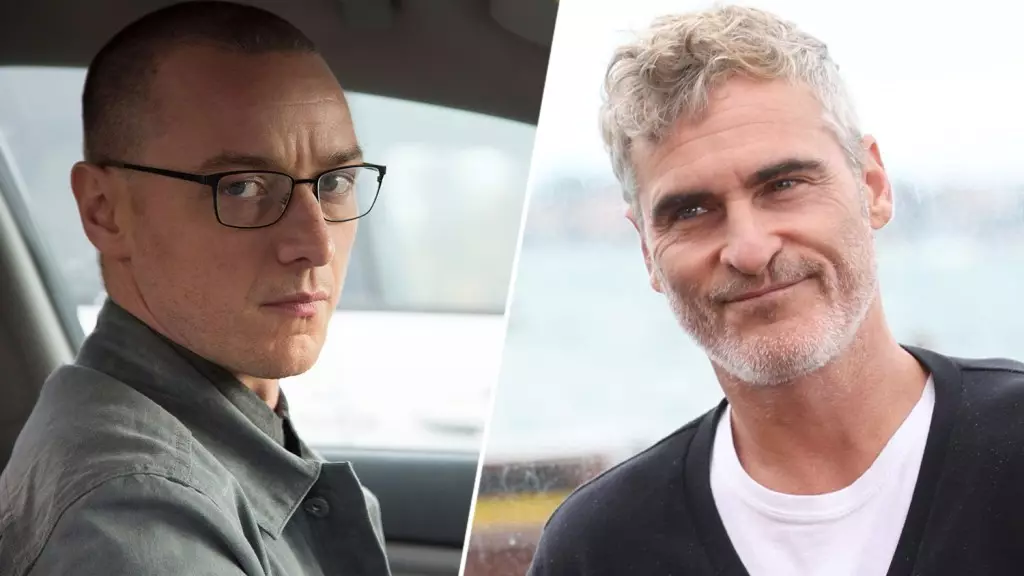The film industry is notorious for its unpredictable dynamics. Production schedules can change in the blink of an eye, leaving filmmakers to scramble for replacements at the last minute. This was the case when Oscar-winning actor Joaquin Phoenix abruptly exited M. Night Shyamalan’s 2016 psychological thriller “Split,” just two weeks prior to the commencement of filming. The abrupt departure of such a high-profile actor could have derailed the project entirely, but it serendipitously led to James McAvoy stepping in, allowing him to deliver a performance that would turn heads. McAvoy’s last-minute joining of the cast not only underscores the capriciousness inherent in film production but also highlights how these surprising shifts can lead to unexpected moments of brilliance.
James McAvoy recently reminisced about the intense pressure he faced while preparing for his role as Kevin in “Split.” On the “Happy Sad Confused” podcast, he humorously commented on the uniqueness of jumping into a character with so little lead time. He remarked, “Sometimes coming in last minute is the best way.” His nonchalant attitude belies the gravity of facing a character with over 20 distinct personalities, each demanding an intricate portrayal. This unconventional approach did not deter McAvoy; instead, it fueled his determination to rise to the challenge. The actor explained how he quickly connected with certain characters, like Patricia and Dennis, while others took longer to develop. This process emphasizes the notion that sometimes pressure can lead to superior creative outcomes.
McAvoy ultimately portrayed Kevin, a man grappling with dissociative identity disorder, in a chillingly effective manner, garnering critical acclaim for his performance. His commitment to embodying each personality convincingly was a vital element of the film’s unsettling atmosphere. Notably, his role involved abducting three teenage girls, a narrative arc that required him to oscillate between vulnerability and danger seamlessly. The actor’s ability to transition between his various personalities not only added layers to his performance but also provided the film’s audience with an unforgettably haunting experience.
Interestingly, McAvoy’s spontaneity in handling the role was complemented by a well-structured script. He acknowledged that the clarity of the screenplay aided in quickly identifying how to approach multiple characters. Nevertheless, there was an undeniable sense of vulnerability when it came time for the table read. McAvoy candidly described feeling anxious as he confronted the prospect of performing for studio executives—an experience that undoubtedly heightened the stakes and perhaps drove him to deliver an outstanding performance. The intricacies of character development combined with last-minute pressures serve as a crucial aspect of McAvoy’s artistic journey.
Coincidentally, McAvoy’s experience was set against the backdrop of another actor’s abrupt departure. Joaquin Phoenix’s reported exit from Todd Haynes’ film, amid anticipation and excitement, illustrated how fragile artistic collaborations can be. Such occurrences remind us that, despite the glamour associated with Hollywood, the industry often operates on shaky ground, with projects being shelved or drastically altered due to unpredictable actor dynamics. In Phoenix’s case, the fallout led to the unfortunate cessation of a film meant to explore passionate themes—bringing attention to how interconnected the success or failure of one project can be to various stakeholders.
Lessons from Past Decisions
James McAvoy’s trajectory isn’t without its own trials either. He recalled nearly missing out on a significant opportunity in the Harry Potter franchise, where the lengthy audition process would have stifled his ability to take on other roles. Ultimately, he made a pragmatic decision that would shape his career and highlight his learning curve as an actor. For McAvoy, that trade-off, though seemingly disadvantageous at the time, allowed for growth, setting a precedent that choices within the industry can define a career’s trajectory.
McAvoy’s experience with “Split” accentuates the unpredictability of Hollywood while celebrating the surprising opportunities that arise from such instability. The artistry involved in stepping into an established narrative just as a production is about to ignite exemplifies resilience and adaptability—traits that any actor must cultivate to thrive in such a fast-paced industry. As the landscape of Hollywood continues to evolve, one can only hope that emerging talents learn from McAvoy’s unique perspective on taking creative risks in an ever-changing environment.

